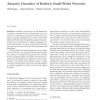Free Online Productivity Tools
i2Speak
i2Symbol
i2OCR
iTex2Img
iWeb2Print
iWeb2Shot
i2Type
iPdf2Split
iPdf2Merge
i2Bopomofo
i2Arabic
i2Style
i2Image
i2PDF
iLatex2Rtf
Sci2ools
CORR
2008
Springer
2008
Springer
Adaptive Dynamics of Realistic Small-World Networks
Continuing in the steps of Jon Kleinberg's and others celebrated work on decentralized search, we conduct an experimental analysis of destination sampling, a dynamic algorithm that produces small-world networks. We find that the algorithm adapts robustly to a wide variety of situations in realistic geographic networks with synthetic test data and with real world data, even when vertices are unevenly and non-homogeneously distributed. We investigate the same algorithm in the case where some vertices are more popular destinations for searches than others, for example obeying power-laws. We find that the algorithm adapts and adjusts the networks according to the distributions, leading to improved performance. The ability of the dynamic process to adapt and create small worlds in such diverse settings suggests a possible mechanism by which such networks appear in nature.
| Added | 09 Dec 2010 |
| Updated | 09 Dec 2010 |
| Type | Journal |
| Year | 2008 |
| Where | CORR |
| Authors | Olof Mogren, Oskar Sandberg, Vilhelm Verendel, Devdatt P. Dubhashi |
Comments (0)

